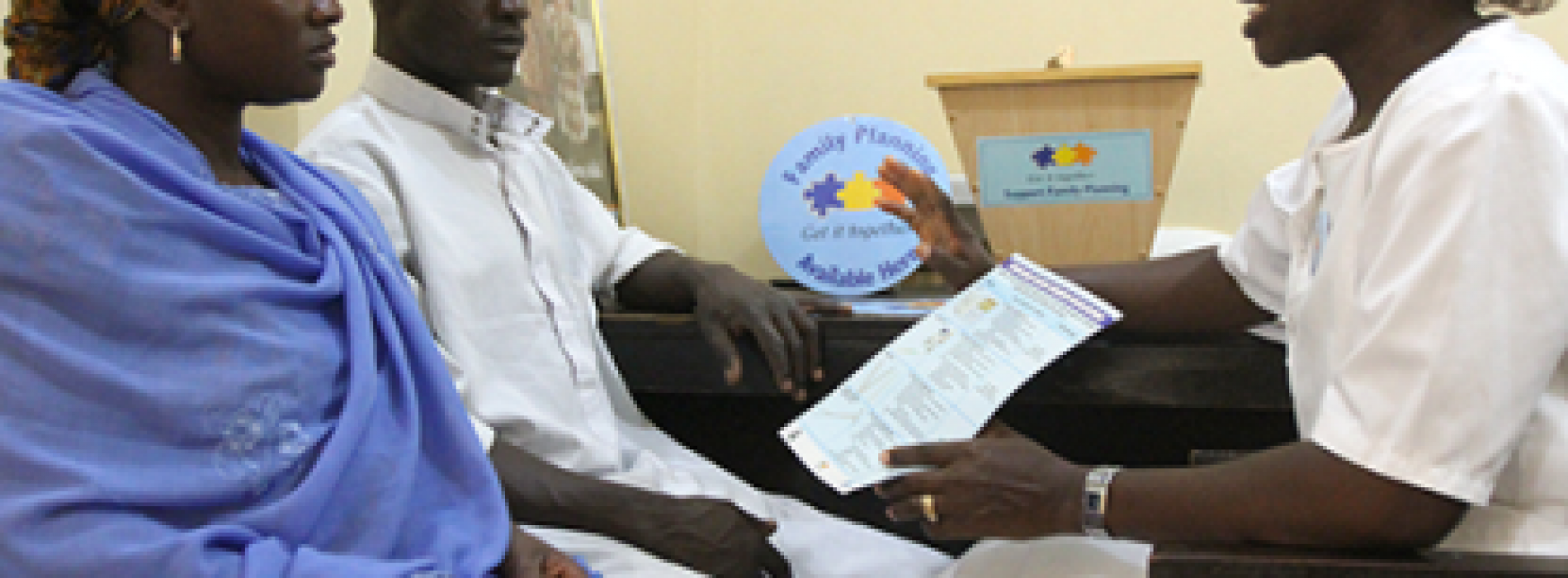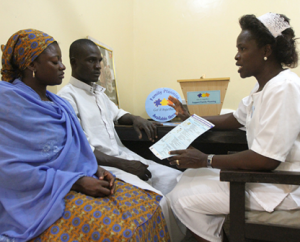Family Planning saves women, booms economy
With the many misconceptions that have reduced the use of family planning methods among couples in Nigeria; thereby, increasing the deaths of pregnant women in childbirth, medical experts have urged every home to embrace FP to save women and boom the nation…writes REBECCA EJIFOMA
Because she needed a male child to help her stand firm in the Igbo family she is married to, 33 years old Mrs. Fedora O. got pregnant every other year. The circumstance resulted in five babies, a near-death delivery and an unwanted pregnancy.
“During my third pregnancy, I begged God for a male. My mother in-law and his sister had started saying things behind me, threatening to give him a fruitful Igbo girl who would give them many grandsons,” she recounted.
Sadly, Fedora had yet another girl. “Ah! The heights of joy had reduced. My husband expressed light joy smothered with patience. But his facial expression showed he was feigning it.” It was my best friend that stood by me bringing me pepper soup and attending to my needs,” she said.
She is not fulfilled without a male child. She said: “But the nurses and doctors warned me not to come back. I didn’t mind them. Is it not my body? So, while my baby was about eight months old, I was already pregnant for the fourth time. Though I was ignorant of my health, I was doing it to keep my home intact.”
Unfortunately for her in-laws, she had yet another girl, which almost led to her death. “I passed out after delivery. When I woke up, the nurses and the gynaecologist told me I bled severely (haemorrhage) after delivery; that my being alive was a miracle. They warned me that more pregnancies would be at my own risk.”
“This time, my husband’s temper outburst its bounds. For one week, he refused to come home – he stayed with a friend living in our street. Even his family stood by him. I had no idea they already brought an Igbo girl for him to marry.
“After that near-death experience, my mother warned me not to dare get pregnant again. “But stubborn me took in again when my baby girl was about two months old. I couldn’t believe it. I had to abort the pregnancy becuase even the doctors told me it was either me or the baby – if not both of us.”
Fortunately, the unwanted pregnancy was flushed. And eight months later, she got pregnant again. This time, however, she vowed to stop childbearing if it was a male. So, she didn’t go for scan. “I didn’t want to be frustrated. Nobody had my time, not even the man who is supposed to be my husband. The four girls were ‘my children’.”
At last, fortune smiled on her. “I had the fifth child, it was a boy. My husband bought Heaven and earth for me when he learnt of it. He threw a party after we were discharged. All his friends came around to greet us with the proverbial gold, frankincense and myrrh.”
That’s the horrible tale of Fedora in Ajegunle city, who has five children of ages in staircase manner – one year gap. Although she has a son of one and half years old now, she says she is ready for another pregnancy for another male child. She told NHO.
Today, experts like the former Director General of the Nigerian Institute of Medical Research (NIMR), Professor Innocent Ujah; the Nigerian Urban Reproductive Health Initiative (NURHI) State Team Leader, Dr. Omasanjuwa Edun; Dr. Duduyemi Adeola and Dr. Sadiat Okaga, Reproductive Health Coordinator, Lagos State Ministry of Health have proffered that FP is the way to reduce the rate of women dying in childbirth.
“Women are the most foolish set of humans I’ve ever seen. Why should you compete to go and die? Why have too many children, those in polygamous homes; because you are looking for a male child?” Ujah asked.
Indeed, research shows that FP is not only the healthy spacing of children but also the healthiest way to live one’s life and enjoy the fruit of one’s labour.
Now, Omasanjuwa, who affirmed that World Health Organisation (WHO)’s recommended 24 months (two years) and above as ideal space between birth, explained, “What that simply means is that at the end of the second year, the woman would have totally regained or have gone back to preconception health status. She would have been fully recovered from the activities that happened during pregnancy and returned fully to pre-pregnancy stage. Then, she is in a good state of health to carry another pregnancy without complications.”
Accordingly, he affirmed that FP reduces the burden on a woman’s nutritional status since the child takes 70 per cent of whatever the woman eats. “This means that it puts the woman at a higher risk of developing complications during pregnancy and during delivery and possibly immediately after pregnancy and to maternal death. We are not saying this or that will happen; but that it puts the woman at a higher risk of developing all the complications that arise from pregnancy,” says Omasanjuwa.
No doubt, these experts are calling on the government’s attention to the alarming figures of maternal deaths (pregnant women) in Nigeria at 576 women dying out of every 100,000 live births. That is, a total of 40,000 pregnant women die every year across 36 states and FCT in the country. This means that Nigeria buries 110 women every 24 hours. And in every one hour, Nigeria mourns five expecting mothers trying to bring lives into this world during childbirth.
After carrying and caring for that pregnancy for nine stressful anticipated months, paying bills for ante-natal and buying many baby needs and all the nutritous food, anguish come on the heels of this news.
Now, among these 110 pregnant women, who die daily in Nigeria, someone somewhere loses an aunt, a daughter, a sister, a wife, a mother, a cousin, a niece, a relative, a friend, a neighbour, a colleague and a customer.
Consequently, there comes more sufferings in 110 homes. While 110 mothers of the dead women cry pitifully, 110 fathers groan every day across 36 states and FCT in the country. This becomes a total of 220 persons disorganised. Now, the siblings of the deceased women become down trodden. Relatives begin to mourn and console the families. Friends are affected, too – visit and even travel for the burial.
Obviously, death, in Nigeria, brings more aggressive expenses. The 110 widowers will need money to care for the dead. This may either turn them into beggars or cripple their finances. Burial rites and buying of space at a morgue then at a cemetery, casket, buying and selling of uniform for the burial (asoebi as done in Nigeria), live band on her wake and refreshment (drinks and cuisine) for sympathisers as done in Nigeria. Even families of the deceased print posters to parade on the day of the wake across many streets.
Sadly, the economy of the nation becomes affected. These about 220 parents plus the 110 new widowers (330 Nigerians) daily of the deceased pregnant women may develop one health issue or the other as a result of the devastating news. While the parents – as elders – may develop HBP or attack, the husbands may neglect their jobs or businesses for some time or get over their loss in the forest of their own thoughts.
As a result, Prof Ujah, a renowned gynaecologist, said, “No woman should die because she wants to bring a life into this world. Our maternal mortality figure is appalling.”
According to him, there are three factors responsible for the deaths of pregnant women in the country known as maternal mortality. “Illiteracy of women, poverty and bad health system/attitude of health professionals towards patients. If our women are educated, then they will be able to make decisions for themselves regarding their health.”
When NHO asked on the link between family planning and deaths of women (maternal mortality), Ujah added, “In my opinion no woman who is on FP gets pregnant. And if you don’t get pregnant, you don’t die of childbirth. FP is very important. If you are practicing effective FP you don’t get pregnant. In a way, it’s an option we must all embrace. And we should preach it.
Now, FP providers and medical doctors say there are two methods of FP: temporary and permanent. “The temporary method is used when you want to space your pregnancy; while the permanent is when you have had the number of children you want,” Duduyemi explained.
Methods of FP
Interestingly, the several methods of FP are: Barrier Methods (Chemical Barrier Method – Spermicides; and Mechanical Barrier Method – Male and Female Condom), Hormonal Contraceptives (Oral Contraceptive Pills, Injectable Contraceptives, Contraceptive Implants), Intra Uterine Devices (IUD) and counselling by experts.”
All the public health centres in Lagos state has a FP service provider. “When a woman goes to the clinic, FP service providers will test the method that will be suitable for her body,” Omasanjuwa told NHO.
Meanwhile, Dr. Okaga assured journalist at a 2-day workshop on FP in Lagos that FP methods are available and free in all 280 Public health centres in Lagos and subsidised at private centres.
So, NHO visited a public health centre in Ajegunle under Ajeromi Ifelodun Local Government for FP services to confirm Okaga’s claims of free and available FP services. But the officer on seat explained the range of prices after he confirmed it on call from his superior. “The implant is for two to three years. There is also insertion and pills. The implant costs between N1,500 and N2000 or less – same with the others.”
The officer asked, “If you are still single, why do you need family planning?” This reporter convinced him that she was about to walk down the aisle and wanted to delay child bearing; hence, he spoke clearly. “Before they do any method on you, you will do Pregnancy Test (PT) first.”
Unfortunately till date, several cultural, religious and traditional misconceptions are said to have hindered the use of FP. This is as statistic shows that only 15.1 per cent of married women between 15 and 49 years use any contraceptive method; thereby increasing the toll of maternal mortality.
All sorts of misconception – traditional, cultural and religious, have killed the efforts of FP. Ujah continued, “Because it happened this way to one, she will spoil the mind of others towards adopting any of the methods. The pills (medicine) wears off within a week or a month. Then you can decide to stop it to get pregnant again.”
Who benefits from family planning?
The woman, child, man, family, community and the nation. “FP allows mothers the opportunity to rest between pregnancies in order to regain her health and strength so that she will avoid complications during and after each pregnancy. She is, also, able to have healthy children/babies.
“She is able to spend quality time with each child, able to breast feed as long as possible thus providing her baby with nutritious food and protection from diseases, reduces maternal ill health and death,” Ujah further said.
Benefits to the Family
FP enhances the family’s nutrition, Promotes economic growth, promotes education of children, improves the quality of life. It provides long-term benefit of breaking the cycle of poverty in the family.
Benefits to the Community/Country
Family Planning allows community to plan and manage its resources effectively; Promotes stability and security in state, peaceful society and basic needs of the people are routinely met. Moreso, it improves the nation’s health, social and economic indices; Harness demographic dividends for economic growth.
Therefore, these experts maintain, family planning is key to unlocking sustainable development goals. It has a long term benefit of breaking the cycle of poverty among families which transcends generations with a ripple effect across the new global development agenda.
Ujah urged: “Everyone should embrace Family Planning and we should.”








0 Comments
No Comments Yet!
You can be first to comment this post!